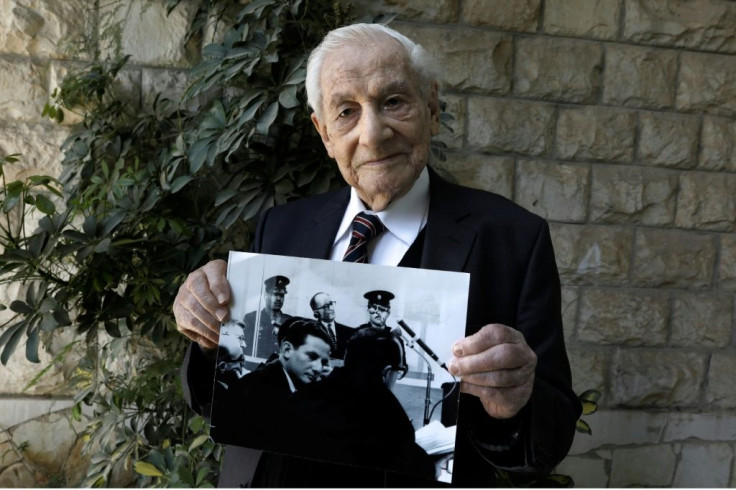60 Years On, Israel Prosecutor Recalls Eichmann Trial
Days after Israel's spectacular announcement that Nazi war criminal Adolf Eichmann had been captured and brought to Israel for trial, Gabriel Bach was given an assignment that forever changed his life.
Bach was Israel's deputy state attorney when, 60 years ago this month, the world learnt that a key architect of Adolf Hitler's "Final Solution" to exterminate Europe's Jews had been seized by Israeli secret agents.
Eichmann was snatched on May 11 by a Mossad team in Argentina, where he had been living under an assumed name. Prime minister David Ben-Gurion announced his capture on May 23.
A few days later, the Germany-born Bach received a call from Israeli justice minister Pinchas Rosen, the now 93-year-old Bach recounted in an interview with AFP at his Jerusalem home.
"He said: 'Mr. Bach, I imagine that you will be one of the prosecutors in the case, but I have a request to make. I would like you to be in charge of the whole investigation against Eichmann'," Bach recounted.
At the trial, which opened in April 1961, attorney general Gideon Hausner was lead prosecutor, with Bach as his deputy.
But it was Bach who led the months-long pretrial investigation, relocating from Jerusalem to northern Israel, where an entire prison had been cleared for Eichmann's detention.
At the prison, renamed Camp Iyar, Bach coordinated a team of some 40 police officers who interrogated and compiled evidence against Eichmann.
Bach said he remains haunted by the man so committed to his genocidal cause that he reportedly chastised fellow Nazis who wavered when forcing Jewish children into gas chambers.
"Not a day passes without me remembering some particular item, or some particular piece of evidence, or some particular moment from the Eichmann trial," said Bach.
Before meeting Eichmann, Bach had already heard terrifying tales about him.
Eichmann had forced extermination camp inmates to write postcards to friends and relatives extolling the beauty of Auschwitz, to encourage them to board trains that would carry them to their deaths.
"That was my first indirect connection with the man we were dealing with," Bach told AFP.
When they spoke for the first time, Bach said he informed Eichmann that he was leading the investigation.
"I told him that if he had any special problems, physical or otherwise, or (regarding) his family, then of course I would be prepared to talk to him," Bach said.
But Bach then limited his direct contact with Eichmann to ensure he did not hear a disclosure that would compel him to appear as a witness, instead of serving as prosecutor.
He gave police daily instructions on how to conduct the interrogation.
Bach also informed Eichmann that Israel would ensure he had the defence lawyer of his choice. Eichmann's family selected German lawyer Robert Servatius.
Bach recalled a rare instance when Eichmann dropped his stoic demeanour, though not for any reason he may have expected.

The accused had been taken to court to view Nazi death camp footage which prosecutors intended to show as evidence.
Bach said he noticed Eichmann grew agitated during the screening and asked what upset him.
Eichmann then complained that "he had been promised that he would never be taken to the court room unless he wears his dark blue suit, and here they have him in his grey suit and a grey pullover", Bach said.
Eichmann, Bach remembered, had insisted that "they shouldn't promise him something like that if they can't keep it".
Eichmann was not the first Nazi Bach had encountered.
Growing up in Berlin, the area where his Zionist school was located had been renamed Adolf Hitler Square.
With anti-Semitism raging through the first five years of the Nazi regime, the Bachs left Germany in 1938.
They made it out just two weeks before Kristallnacht -- the Night of Broken Glass -- when Nazi thugs rampaged through Germany, torching synagogues, looting businesses and killing dozens of Jews.
While running on a platform to catch a train to Holland, Bach said he was kicked by a Nazi SS officer.
"I was literally kicked out of Germany," he told AFP.
After a stay in Holland, the Bachs moved to the former British-mandated Palestine.
Eichmann's trial in Jerusalem attracted massive international attention and helped shape global understanding of the Holocaust through the abundance of evidence presented.
Bach said he was confident of a conviction but understood many Jews opposed the death penalty.
He shared reservations about capital punishment but argued it could be justified for crimes of genocide.
Eichmann was sentenced to death by hanging on December 15, 1961. After his appeal was denied he asked Israeli president Itzhak Ben-Zvi for clemency.
In late May 1962, prosecutors learnt the president was set to deliver his decision, but there was division over when to execute, assuming clemency was denied.
Some argued "there was no rush", Bach recalled -- but he disagreed, worrying a Nazi sympathiser somewhere could abduct a Jewish child and threaten to harm them if Eichmann was put to death.
Bach said he had advised at the time that if clemency was refused "at 11 pm, we execute at midnight".
"And that is what happened," on June 1, 1962, Bach said.
"The police invited me to be present. I didn't want to be present. We had done our job."
© Copyright AFP 2024. All rights reserved.





















